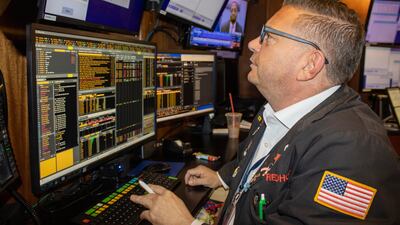The clashes between Israel and Hamas caught markets off guard at the weekend, resulting in large inflows into gold and the US dollar on the back of safe-haven buying.
On Monday, US markets opened down but had recovered by the close of trade after investors shook off fears of the conflict. The Dow Jones Industrial Average closed nearly 200 points up, while the S&P 500 ended the day 0.63 per cent higher.
However, further escalation could halt any positivity in stock markets and keep asset classes like gold and oil elevated.
Watch: Israel airstrikes continue under darkness in Gaza
At the time of writing on Tuesday, gold was trading at $1,862.08, after hitting lows of $1,810 last week.
The conflict has stymied gold bears for the immediate short term, and upsides look good towards the channel of $1,900 to $1,920.
Meanwhile, last Friday's non-farm payroll reports showed continuous growth in the US labour market in September – coming in at 336,000 new jobs, almost twice as much as expected. There were revisions in the previous month’s reading as well.
Following the release, Treasury yields spiked higher, with the 10-year yield topping out above 4.88 per cent, while the 2-year yield breached 5.15 per cent.
In the equities segment, after initially selling off on the news, US bourses sharply recovered to close out a wild session in the green.
The recovery in equities on Friday is particularly interesting.
The spike in yields and initial weakness in equities is a common theme – stronger data means higher rates as the US Federal Reserve tries to cool inflation
However, the recovery in stocks on Friday suggests that markets see improving jobs data and a dip in inflation, as a sign that recession risks may be fading.
Recall that increasing rates have widespread effects across the economy, particularly on the housing market, credit conditions and, crucially, the performance of corporate earnings.
Higher interest rates eat into corporate earnings, which hurt companies and the market, and ultimately lead to recessionary conditions.
However, the bounce back on Friday shows that markets now see the rock solid labour market and waning inflation as a sign of a soft landing.
There are still many underlying risks in the market, including turmoil in Washington and overseas, so it’s still premature to conclude we are anywhere near stable markets.
We will need to keep a tab on upcoming data points to see if this theory holds any water.
It starts with Wednesday’s US Producer Price Index print, due at 4.30pm UAE time.
The PPI measures the changes in the price of goods sold by US manufacturers and is a leading indicator of consumer price inflation.
Overall PPI, which includes food and energy, could be in line or slightly lower as a result of the sell-off in energy markets last week.
Therefore, focus on the core PPI print, which strips out these two segments. Core PPI is expected to increase 2.3 per cent year on year, versus a previous reading of 2.2 per cent.
On Thursday, we await consumer price data, which markets expect to show more signs of a slowdown in inflation.
Any materialisation of weakening inflation will, no doubt, continue to be strong for equities, currencies and commodities against the US dollar.
We also see the start of earnings season for the third quarter, with banking giants like Citigroup and JP Morgan announcing from Friday before markets open.
Other notable earnings include Tesla on October 18 before Big Tech starts announcing from October 24.
Based on the above, this earnings season will be critical as we scrutinise companies’ forward guidance and views on economic conditions.
Gaurav Kashyap is a risk manager at Equiti Securities Currencies Brokers. The views and opinions expressed in this article are those of the author and do not reflect the views of Equiti Securities Currencies Brokers


